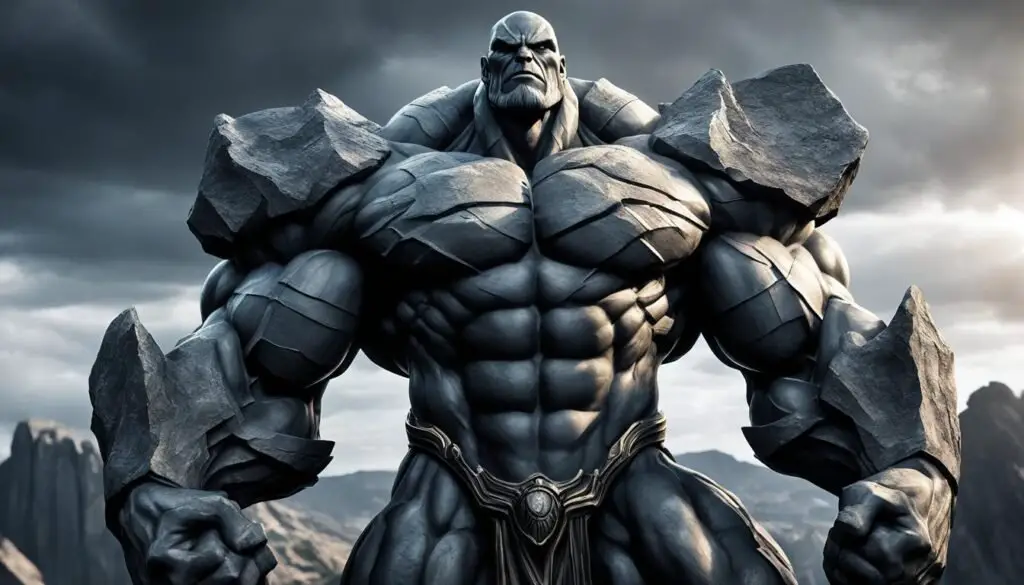Greek mythology is filled with legends and gods, but among them, one titan reigns supreme in terms of power and influence. In this article, we delve into Greek mythology to uncover the identity of the strongest titan. From the titan hierarchy to their god-like powers, we explore the fascinating world of the titans in Greek mythology.
Key Takeaways:
- Discover the strongest titan in Greek mythology and their legendary power.
- Explore the hierarchy and unique strengths of the titans.
- Uncover the creation and legacy of these ancient mythical beings.
- Understand the nuanced concept of strength in Greek mythology.
- Learn how the titans shaped the world and influenced the rise of the Olympian gods.
The Titans in Greek Mythology
Greek mythology is a vast collection of stories and legends featuring numerous gods and goddesses. Among these divine beings, the titans hold a significant place in the ancient mythological pantheon. The titans, known as the earliest gods and goddesses in Greek mythology, preceded the mighty Olympian gods. They were born from the union of Gaea, the earth, and Uranus, the sky. These powerful titans played a crucial role in the creation of the world and the subsequent rise of the Olympian gods.
According to Greek mythology, the titans were the children of Gaea and Uranus. They were beings of immense power and held dominion over various aspects of the universe. The titans acted as the bridge between the primordial chaos and the more structured world that followed. They shaped the natural elements, established order, and influenced the destinies of mortals and immortals alike.
The titans were a diverse group, each embodying different aspects of the natural world. Some of the notable titans include Oceanus, the titan associated with the sea, and Atlas, known for his role in bearing the weight of the sky. Other titans such as Rhea, Themis, and Cronus played vital roles in shaping the course of Greek mythology.
The tales of the titans are woven throughout Greek mythology, showcasing their strength, wisdom, and influence. Though they were eventually overthrown by the Olympian gods, the titans’ legacy is firmly embedded in the fabric of Greek culture and mythology. Their stories continue to captivate and inspire, providing a glimpse into a world where gods and mortals intertwine.
The Creation of Titans
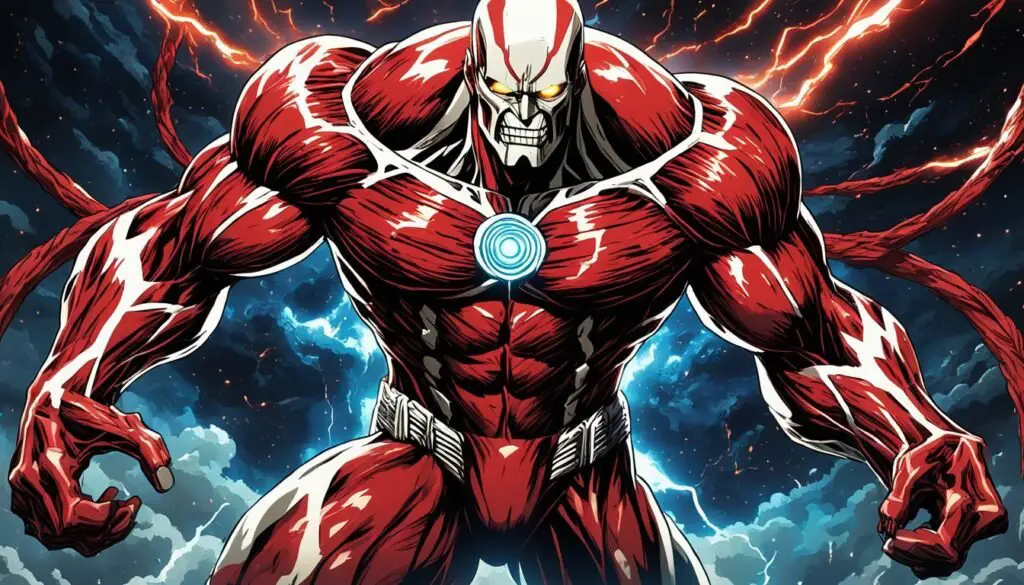
According to Greek mythology, the creation of the titans begins with Chaos, the primordial state of the universe. Out of Chaos emerged three powerful beings: Tartarus, the abyss; Gaea, the earth; and Eros, the god of love. It was Gaea who would play a crucial role in the birth of the titans and the shaping of the world.
Gaea, the personification of the earth, married Uranus, the personification of the sky. Their union gave birth to twelve mighty titans, who were larger than mountains and possessed immense power. These titans were Oceanus, Coeus, Crius, Hyperion, Iapetus, Cronus, Thea, Rhea, Themis, Mnemosyne, Phoebe, and Tethys.
However, Gaea and Uranus also had other offspring, such as the cyclopes and the monstrous sons known as the Hecatoncheires. These children were cast into the underworld prison of Tartarus by Uranus, which filled Gaea with rage and a desire for revenge.
This act of cruelty by Uranus towards their children sparked Gaea’s cunning plan to overthrow him and establish her children, the titans, as the rulers of the universe. Gaea sought the aid of Cronus, one of her titan sons, who willingly agreed to carry out her plan. With his mother’s guidance, Cronus castrated Uranus, dethroning him and claiming his place as the ruler of the cosmos.
The creation of the titans, orchestrated by Gaea and fueled by her desire for revenge, set in motion a chain of events that would shape Greek mythology and the world as we know it.
The Twelve Titans
In Greek mythology, the twelve titans were powerful beings that governed different aspects of the universe. These titan gods played a significant role in shaping the world of Greek mythology and the stories of the gods that followed.
The twelve titans were:
- Oceanus
- Thetis
- Hyperion
- Coeus
- Phoebe
- Crius
- Mnemosyne
- Iapetus
- Themis
- Cronus
Additionally, there are two more titans whose names vary in different sources. Each titan possessed unique strengths and abilities, contributing to the rich tapestry of Greek mythology.
The titans symbolize the powerful forces of nature and hold a significant place in Greek mythology. Their stories continue to captivate and inspire, leaving a lasting legacy in the realm of ancient mythology.
Oceanus – The Titan of the Sea
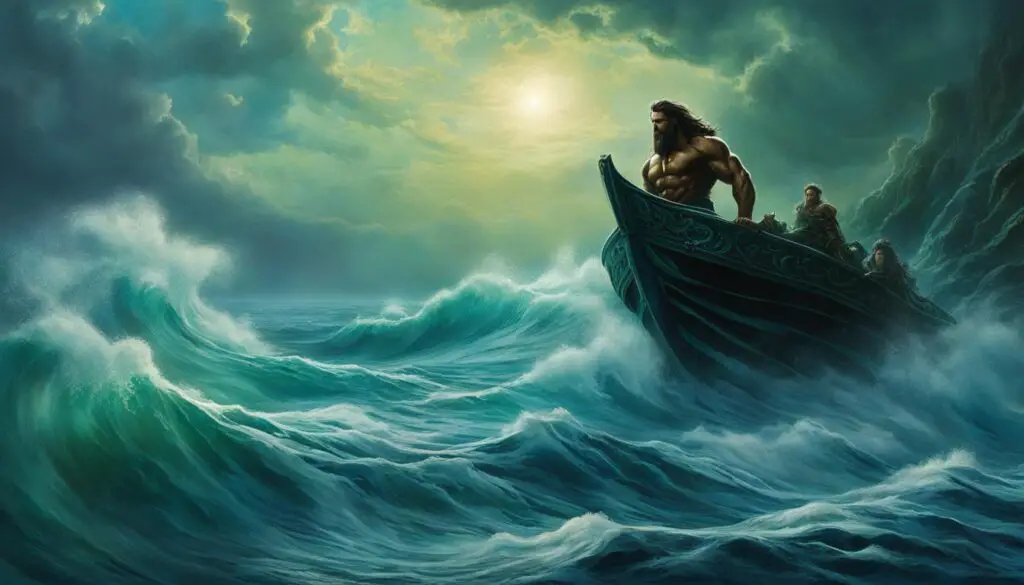
In Greek mythology, Oceanus, the eldest titan, held dominion over the vast expanse of the sea and water. His power extended to the depths of the ocean and the currents that shaped the world. Oceanus was married to his sister Thetis, and together, they were the parents of a remarkable offspring known as the Oceanids. These mythical sea and river nymphs numbered around 6000 and were closely associated with the waters they inhabited.
Oceanus played a vital role in the early creation and foundation of the world. However, after the rise of the Olympian gods, Oceanus relinquished control of his domain, entrusting it to his nephew Poseidon, the renowned god of the sea. Despite ceding his role, Oceanus continued to exist as a fundamental ocean deity, representing the powerful and ever-changing nature of the sea.
The Oceanids
The Oceanids, the progeny of Oceanus and Thetis, were divine nymphs who embodied the beauty and essence of the sea and rivers. They were associated with various aquatic features and played important roles in Greek mythology.
- These mystical creatures were renowned for their ability to heal, inspire, and have direct influence over the waters.
- The Oceanids served as attendants to Poseidon and other sea gods and goddesses, assisting in the protection and preservation of the marine environment.
- Notable Oceanids found in Greek mythology include Styx, the river that formed the boundary between Earth and the Underworld, and Amphitrite, the wife of Poseidon.
The Oceanids embodied both the calm serenity and tempestuous nature of the sea, reflecting the diverse and complex characteristics of Oceanus, their titan parent, and the domain they called home.
Prometheus – The Crafty Titan
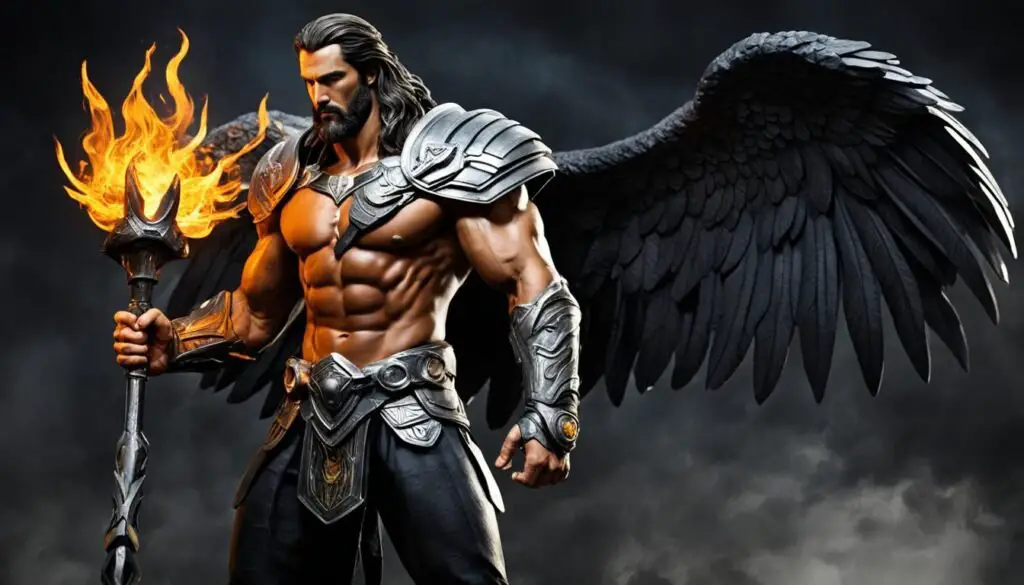
Although not the strongest titan, Prometheus holds a prominent place in Greek mythology. As the titan of forethought and crafty counsel, Prometheus played a vital role in shaping the world as we know it. He is famously known for molding mankind out of clay, a feat that showcased his creative abilities.
But it was Prometheus’s audacious actions that truly set him apart. He defied the gods by stealing fire and gifting it to humanity, an act that ignited progress and civilization. This act of generosity brought immense knowledge and technological advancements to humans, empowering them in unimaginable ways.
However, Prometheus’s brave act did not go unnoticed by Zeus, the ruler of the gods. Enraged by Prometheus’s defiance, Zeus devised a punishment that would forever haunt him. Prometheus was chained to a rock, where an eagle would repeatedly devour his regenerating liver, causing endless agony.
Despite the torment, Prometheus would not bend. He remained steadfast and defiant, refusing to beg for mercy. His actions and steadfastness made him a symbol of human resilience and the consequences of challenging divine authority.
Atlas – The Titan Who Bears the Sky
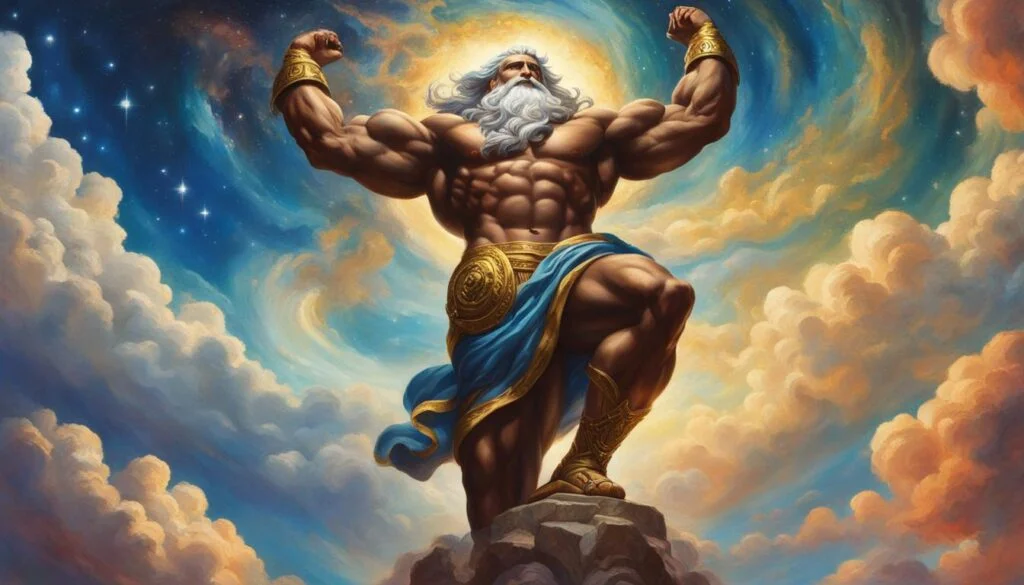
Atlas is a prominent figure in Greek mythology, renowned for his role in bearing the weight of the sky. According to Greek legends, after the Titanomachy, a great war between the titans and the Olympian gods, Atlas was assigned the eternal task of holding up the heavens on his shoulders.
Despite not being considered the strongest titan in terms of power, Atlas’s burden of carrying the sky has made him an iconic character in Greek mythology. His colossal strength and the enduring nature of his punishment have captured the imagination of countless generations.
As the titan who bears the weight of the sky, Atlas represents the indomitable force required to support the heavens. His monumental task symbolizes the eternal struggle of maintaining balance and shouldering heavy responsibilities.
The tale of Atlas serves as a reminder of the profound consequences that can arise from challenging the authority of the gods. His story intertwines with other Greek myths, signifying the interconnectedness of Greek mythology and the vastness of its lore.
The Role of Atlas in Greek Mythology
- Atlas is the son of the titan Iapetus and the Oceanid Clymene.
- He is often depicted as a colossal figure, standing at the edge of the earth, supporting the heavens above.
- Atlas is closely associated with the mythical mountain range in northwestern Africa, which bears his name – the Atlas Mountains.
- Some stories suggest that Atlas was entrusted with guarding the boundaries of the world, preventing the heavens from descending upon the earth.
Although not recognized as the strongest titan in terms of raw power, Atlas’s role as the titan who bears the sky has solidified his place as a legendary figure in Greek mythology. His enduring presence in ancient lore showcases the rich tapestry of tales that make up this captivating mythological universe.
The Power Hierarchy among Titans
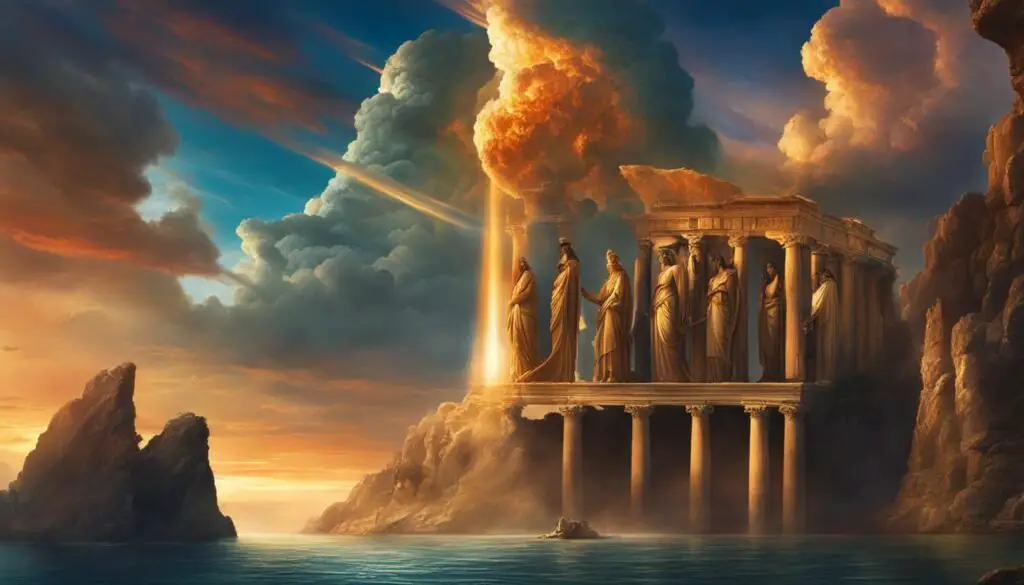
In Greek mythology, the power hierarchy among the titans is a fascinating topic. While each titan possessed immense strength and abilities, one titan stands out as the strongest – Cronus. Despite being the youngest child of Gaea and Uranus, Cronus managed to overthrow his father and claim rulership over the universe.
Cronus played a pivotal role in the rise of the Olympian gods, shaping the course of Greek mythology. As the ruler of the Titans, he held significant power and influence, instilling fear and awe in both gods and mortals alike.
However, it’s crucial to note that the concept of strength and power in Greek mythology can be subjective. Other titans, such as Oceanus and Atlas, held their own unique positions and played essential roles in the Greek pantheon. The power hierarchy among the titans is not simply determined by physical prowess but also by their domains, responsibilities, and contributions.
The Legacy of the Titans
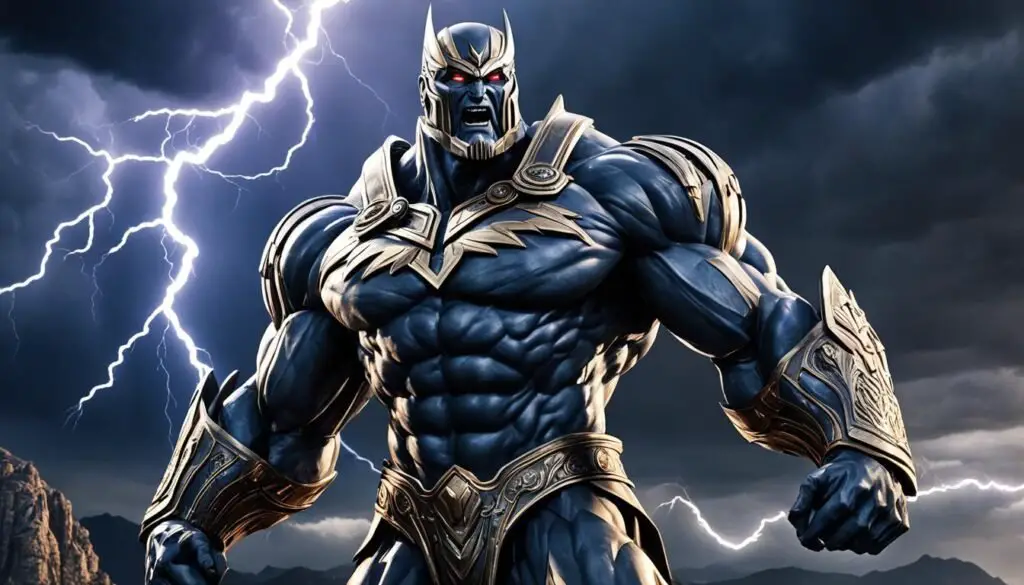
While the titans were eventually overthrown by the Olympian gods, their legacy lives on in Greek mythology. The titans played a significant role in the creation of the world and the rise of the Olympian gods, leaving an enduring mark on the mythological landscape.
Many of the Olympian gods are descendants of the titans, further intertwining their stories with the tales of their titan ancestors. The titans’ contributions to Greek mythology showcase their immense power and influence.
Despite their defeat, the titans’ legacy continues to captivate and inspire. Their stories serve as a reminder of the ancient power dynamics and the intricate relationships between the gods and mortals in Greek mythology.
Conclusion
In Greek mythology, the titan hierarchy and the stories surrounding these ancient beings provide a captivating glimpse into the early origins of Greek mythology. While Cronus is often hailed as the strongest titan, the concept of strength in Greek mythology goes beyond physical power. It encompasses cunning, influence, and the ability to shape the world around them. Each titan played a distinct role in the creation of the universe and the rise of the Olympian gods, leaving a lasting legacy that continues to fascinate and inspire.
From Oceanus ruling over the seas to Prometheus, the crafty counsel, each titan brought unique attributes to the mythological narrative. Atlas, although not the most powerful, is forever immortalized as the titan who bears the weight of the sky. These tales of gods and titans intertwine, revealing the complex and intricate web of relationships that existed in Greek mythology.
As we explore the diverse stories of the twelve titans and their hierarchy of power, we gain a deeper understanding of the rich tapestry of Greek mythology. The titans’ influence cannot be underestimated, as their stories continue to resonate and captivate audiences today. Greek mythology serves as a timeless reminder of the enduring power of ancient tales and their ability to ignite our imagination and curiosity.
FAQ
Who is considered the strongest titan in Greek mythology?
While strength and power can be subjective in Greek mythology, Cronus is often regarded as the strongest titan. He overthrew his father Uranus and ruled over the universe as the leader of the Titans.
How do the titans fit into Greek mythology?
The titans were powerful beings who predated the Olympian gods in Greek mythology. They played a crucial role in the creation of the world and the rise of the Olympian gods.
Who were the parents of the titans?
The titans were the children of Gaea, the earth, and Uranus, the sky, in Greek mythology.
How many titans were there?
There were twelve titans in Greek mythology: Oceanus, Thetis, Hyperion, Coeus, Phoebe, Crius, Mnemosyne, Iapetus, Themis, Cronus, and two more whose names differ in various sources.
What was Oceanus the titan of?
Oceanus was the titan who ruled over the sea and water in Greek mythology.
What was Prometheus known for?
Prometheus was the titan of forethought and crafty counsel. He played a significant role in the creation of mankind and defied the gods by giving fire to humans.
What punishment was given to Atlas?
Atlas was punished by Zeus to bear the weight of the heavens on his shoulders, making him a notable figure in Greek mythology.
How did the titans contribute to Greek mythology?
The titans’ contribution to Greek mythology was significant. They were the ancestors of many of the Olympian gods and their stories intertwined with the tales of the titans.
Can strength in Greek mythology be subjective?
Yes, strength and power in Greek mythology can be nuanced and subjective, as there are various interpretations and perspectives.
What is the legacy of the titans?
The legacy of the titans in Greek mythology is their enduring presence and their role in the creation of the world and the rise of the Olympian gods.


